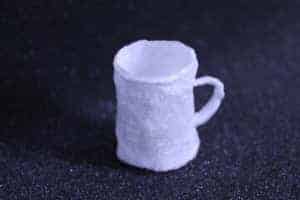A plastic composed of DNA and vegetable oil could be the most sustainable ever developed and replace the current one in packaging and electronic devices.
A new DNA-based plastic requires little energy to manufacture, is easy to recycle and break down.
Traditional plastics, as you know, are very harmful to the environment. They are made from non-renewable petrochemicals, require intense heating and toxic chemicals to produce, and take hundreds of years to degrade. Only a small part of these can be recycled: the rest ends up in landfill, incinerated or... in the environment.
Alternative plastics they come from plant sources such as corn starch and algae. They are becoming increasingly popular because they are renewable and biodegradable, but it also takes a lot of energy to produce them, and they are difficult to recycle.
Dayongyang from Tianjin University in China and his colleagues have developed a plastic that overcomes these problems.
A DNA-based plastic to be recycled indefinitely?
The plastic developed by Yang is made by connecting short strands of DNA with a chemical derived from vegetable oil, which produces a soft, gel-like material. This gel can be molded into molds and then solidified using a freeze-drying process that draws water from the gel at low temperatures.
The study has been presented in the journal American Chemical Society.
The researchers made several objects using this technique, including a cup (you see it in the photo), a triangular prism, puzzle pieces, a model of a DNA molecule (pictured below) and more. They also managed to recycle these objects by immersing them in water, where they converted into a gel that could be remodeled into new forms.

What is striking about this plastic is that you can immediately "melt" it and start over. Most of the research has focused on developing bioplastics that biodegrade, but the real breakthrough is being able to fully recycle them so they don't go to waste.
The raw material abounds
Another advantage of the new plastic is the widespread availability of the raw material. I would say that there is no shortage of DNA: on Earth there are an estimated 50 billion tons of it. The one used by Yang and colleagues comes from salmon sperm, but it could also be made from crop waste, algae or bacteria.
Since the production of DNA-based plastics does not require high temperatures, produces 97% less carbon emissions compared to traditional plastic. As far as I know, they are more sustainable than any other plastic ever seen.
And now the cons of plastic that can be recycled indefinitely
After so many pros, here is a disadvantage that appears evident to me, at least at the moment. First, if to melt this plastic it is enough to wet it, I see it hard for massive use. Perhaps it is more suitable for packaging, electronic devices and uses in waterproof environments (which would not be cheap anyway, on the contrary).
Anyway Yang works to perfect this material: "It's just the beginning," he says.


